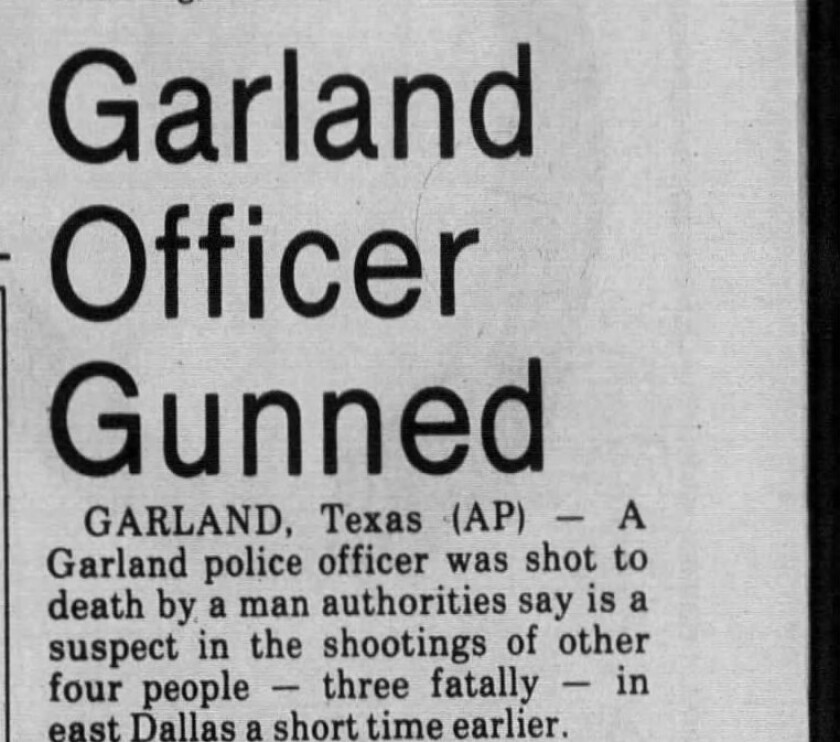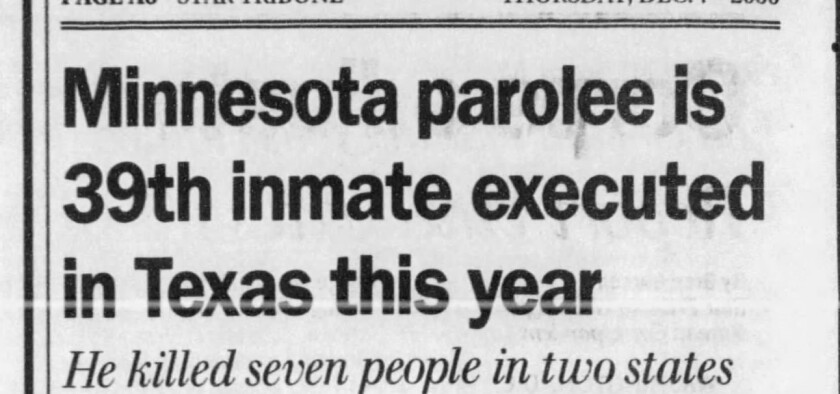Daniel Joe Hittle served just 11 years in prison for the double homicide of his parents before being released on parole for good behavior in 1984 – a decision that ultimately resulted in the murder of five Texas residents in 1989.
Hittle was convicted on two counts of second-degree murder for fatally shooting his adoptive parents in their Motley, Minnesota farmhouse in the spring of 1973.
ADVERTISEMENT
He was sentenced to serve 30 years in prison, yet was released on parole for good behavior in 1984.
He relocated to Texas, where he went on to slay five people in 1989, including a police officer and a 4-year-old girl.
He was executed by lethal injection in Texas on Dec. 6, 2000, for a capital murder conviction stemming from his 1989 shooting spree.
Hittle was 23 years old when he fatally shot his adoptive parents – 46-year-old Henry Hittle and 45-year-old Margaret Hittle – at their rural Minnesota farmhouse in 1973.
Confrontation with parents
The deadly argument began when Hittle confronted his parents at around 11 p.m. on April 4, over an alleged scratch on his truck, which he believed had been caused by their dog.
His childhood friend, Gary Wentworth, told the Star Tribune in 2000 that Hittle opened fire on his parents after Margaret Hittle dared him to do so. It was the dramatic ending of a tense relationship between the two, who clashed over religion and disciplinary measures.
After shooting her, Henry Hittle attempted to reach for his gun in an act of defense.
But, it was too late.
ADVERTISEMENT
Their bodies were discovered near the front entryway of their farmhouse by sheriff’s deputies who arrived at the scene an hour later.
Wentworth told the Star Tribune that Hittle told him, while serving time in Stillwater Correctional Facility, that he was drunk at the time of the murders – a state-of-mind Wentworth claimed was dangerous for Hittle.
“He was never really violent, but he’d get that way when he drank,” Wentworth told the Star Tribune. “He didn’t like people making fun of him. We’d have sleepovers at each others’ houses. My mom always thought he was a nice kid – quiet and polite.”
Wentworth passed away in 2008.
Hittle was charged with two counts of first-degree murder for the slaying of 46-year-old Henry Hittle and 45-year-old Margaret Hittle. He later pleaded guilty to two counts of second-degree murder. A judge sentenced him to two concurrent 30-year sentences.
Yet just 11 years after Hittle entered the gates of Stillwater Correctional Facility, he was granted parole for good behavior.
The consequences of that decision, in this case, proved detrimental to the lives – and families – of five Texas residents in 1989.
ADVERTISEMENT
Texas rampage
Hittle was living outside of Dallas – on parole from Minnesota – in 1989 when he became enraged over an argument allegedly having to do with a drug deal arrangement.
The source of his anger was 39-year-old Mary Alice Goss, who was later identified through court documents as his previous drug dealer.
On the evening of Nov. 15, 1989, Hittle was pulled over by Garland Police Officer Gerald Ray Walker for speeding. The routine traffic stop resulted in Walker’s death – Hittle shot him at close range in the chest.

Then, he went on to his ultimate destination.
Hittle entered the home in which Goss was staying. He shot and killed Goss, along with two men, 36-year-old Richard Joseph Cook and 19-year-old Raymond Scott Greg. Their bodies were later discovered by a woman who had left the house prior to the shootings.
Along with the bodies of the three adults, the woman also discovered that Goss’ daughter, 4-year-old Christy Condon, had been shot in the face.
At roughly the same time, Walker’s body was discovered in the street by an off-duty firefighter, according to an Associated Press article from the time.
ADVERTISEMENT
Condon was transported to a nearby hospital, where she died days later.
Walker was declared dead just after midnight the next morning at Baylor University Medical Center. The 48-year-old officer was a husband and father, according to the Associated Press.
After crash, a gun battle
Hittle’s truck was identified by law enforcement shortly after his killing spree. Garland police officers chased Hittle’s truck, which eventually crashed, leading to his arrest.
A Nov. 16, 1989 Associated Press article states that after the crash, Hittle began to shoot at officers — he stopped once he ran out of bullets. Hittle was transported to a local hospital for bruises and scratches before ultimately being taken to the Garland City Jail on capital murder and attempted capital murder charges.
Hittle was later convicted for capital murder related to Walker’s death. The jury deliberated for just one hour before returning the verdict.
A week later, he was sentenced to death by lethal injection.

“Hittle, who seemed jovial and carefree throughout the trial, said nothing, merely nodding when State District Judge Richard Mays pronounced the death sentence,” an Associated Press story stated at the time.
ADVERTISEMENT
Because Hittle was sentenced to death for the murder of Walker, prosecutors did not pursue convictions for the four other deaths.
Hittle’s sister, Judy Anderson, testified against her brother in the Texas trial, stating that he had to be stopped from going on to hurt anyone else. Anderson died in 2018.
After learning that Hittle would receive the death penalty for the murder of her husband, Becky Walker told the Associated Press that she was concerned that parole laws in states throughout the country weren’t protecting Americans.
“There are other Hittles running around out there,” she told the Associated Press.
After a series of failed appeals, Hittle was executed in Texas on Dec. 6, 2000. Becky Walker served as a witness.
Minnesota law states that sentencing for a second-degree murder conviction cannot exceed 40 years – a first-degree murder conviction leads to a mandatory life sentence.





























